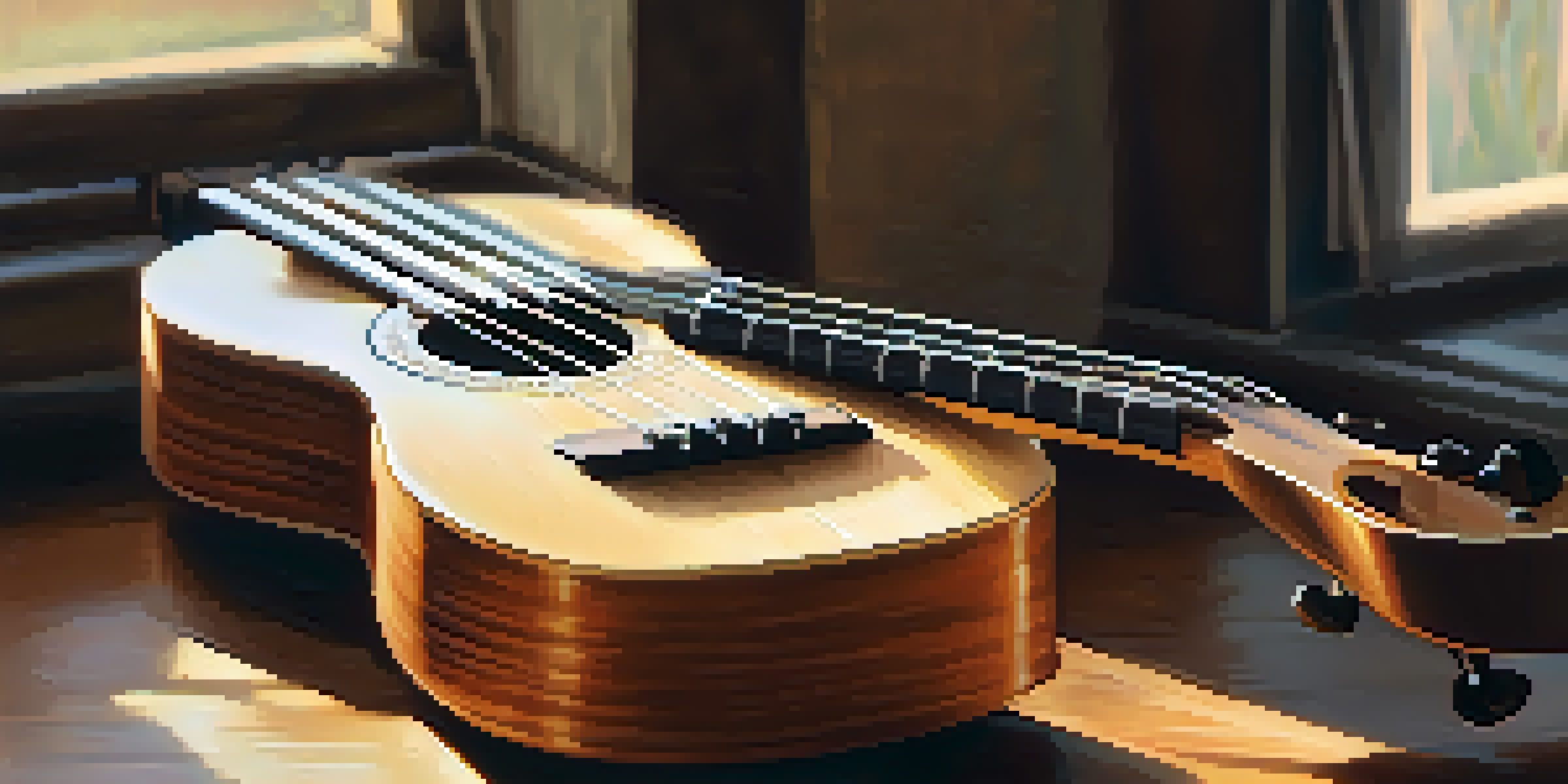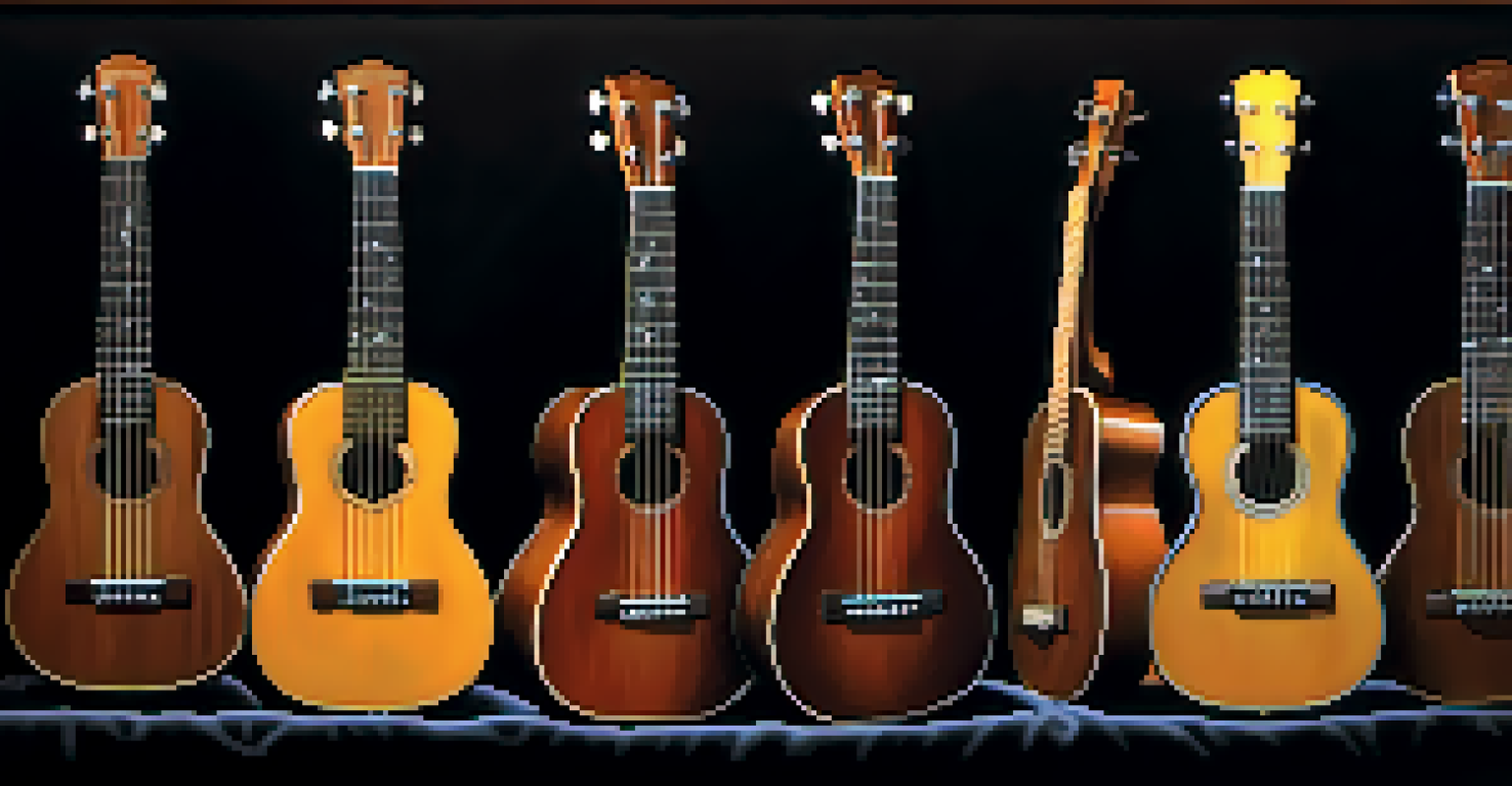Exploring Different Types of Ukulele Strings Available Today

Understanding Ukulele String Materials and Their Impact
When it comes to ukulele strings, the material plays a crucial role in sound quality and playability. Common materials include nylon, fluorocarbon, and steel, each offering a distinct tonal character. For instance, nylon strings are known for their warm, mellow sound, making them a favorite among traditional players.
The sound of the ukulele is like a smile; it instantly brightens your day.
Fluorocarbon strings, on the other hand, provide brighter tones and greater projection, giving your music a vibrant edge. Many musicians appreciate the durability of these strings, as they tend to withstand changes in humidity and temperature better than nylon. Steel strings, while less common on ukuleles, can produce a metallic brightness that some players may find appealing.
Ultimately, the choice of string material can significantly influence your playing experience. As you explore different types, consider how each material affects your sound and comfort during play. This understanding will help you select the right strings for your musical style.
Nylon Strings: The Classic Choice for Ukulele Players
Nylon strings are often regarded as the traditional choice for ukulele players, especially for those who appreciate a softer tone. They provide a warm and mellow sound that resonates beautifully, making them ideal for strumming and fingerpicking alike. Many beginners start with nylon strings due to their smooth feel and gentle touch on the fingers.

One of the standout features of nylon strings is their flexibility. This allows for easy bending and manipulation, which can enhance your playing techniques. However, they can be more susceptible to humidity and temperature changes, which may affect tuning stability over time.
Ukulele String Materials Matter
The choice of string material—nylon, fluorocarbon, or steel—affects sound quality and playability.
For players focused on genres like Hawaiian or folk music, nylon strings can truly shine. They allow for expressive playing, making it easier to convey emotions through your music. If you're looking for a classic sound that feels comfortable under your fingers, nylon strings are worth considering.
Fluorocarbon Strings: Brightness and Durability Combined
Fluorocarbon strings have gained popularity among ukulele enthusiasts for their bright and clear sound. They are made from a synthetic material that offers a more modern alternative to traditional nylon strings. Many players notice improved projection and clarity, making them suitable for both solo performances and group settings.
Music can change the world because it can change people.
In addition to their tonal qualities, fluorocarbon strings demonstrate excellent durability. They resist wear and tear better than nylon, making them a smart choice for those who play frequently or in varying environmental conditions. This resilience means you can focus on your music without worrying as much about string breaks.
Whether you're strumming along to your favorite songs or performing at an open mic, fluorocarbon strings can elevate your sound. Their bright character complements a wide range of musical styles, from pop to jazz, allowing for versatility in your playing. This makes them a fantastic option for both beginners and seasoned players looking to enhance their sound.
Steel Strings: A Unique Option for Certain Ukulele Styles
Though steel strings are less common on traditional ukuleles, they offer a unique sound that some players find appealing. These strings can produce a bright, cutting tone that stands out in a mix, making them popular in certain genres like bluegrass and folk. However, they require a ukulele designed for steel strings to handle the increased tension.
One of the advantages of using steel strings is their ability to maintain tuning stability, which is vital for performance. This feature makes them a reliable choice for musicians who play regularly and need their instrument to stay in tune. Additionally, steel strings can enhance projection, allowing your playing to carry in larger venues.
Wound vs. Unwound Strings Explained
Wound strings offer a fuller tone for lower pitches, while unwound strings provide brightness for higher notes.
While they may not be the first choice for everyone, steel strings can provide a refreshing sound for those willing to explore. If you're intrigued by the idea of a brighter and more powerful tone, consider giving steel strings a try. Just remember to pair them with the right instrument for the best results.
Wound vs. Unwound Strings: What’s the Difference?
When selecting ukulele strings, you'll come across two main types: wound and unwound. Wound strings typically consist of a core wrapped in a metal wire, which provides a fuller sound and a richer tone. These strings are often used for the lower pitches of the ukulele, contributing to a well-rounded sound that enhances your overall playing experience.
In contrast, unwound strings are made of a single strand of material, such as nylon or fluorocarbon. They tend to produce a brighter, clearer sound, which makes them ideal for the higher pitches on the ukulele. Many players enjoy the crispness of unwound strings when playing melodies or intricate fingerpicking patterns.
Choosing between wound and unwound strings depends on your personal preferences and playing style. If you're looking for a warmer, fuller tone, you might lean towards wound strings. However, if bright, clear melodies are your focus, unwound strings could be the better fit. Experimenting with both types can help you discover the sound that resonates with you.
String Gauges: Finding the Right Thickness for You
String gauge refers to the thickness of the strings, and it can significantly impact your playing experience. Thicker strings (often referred to as heavy gauge) can produce a louder sound and are excellent for strumming, while lighter gauge strings are easier to play and bend, making them great for fingerpicking. Finding the right gauge is essential for achieving the sound and feel you desire.
Many players start with medium gauge strings, which provide a balanced sound and playability. As you gain experience, you may want to experiment with different gauges to see how they affect your playing style. For example, if you're looking for more volume and projection, heavy gauge strings might be your best bet.
String Gauge Influences Playability
Thicker strings produce louder sounds, while lighter strings are easier to play, making gauge selection crucial for comfort.
Conversely, if you're just starting out or prefer a softer touch, lighter gauge strings can be a great choice. They require less finger pressure, making it easier to build your skills. Ultimately, the right string gauge is a personal choice that can enhance your overall enjoyment of playing the ukulele.
Specialty Strings: Exploring Unique Options for Your Ukulele
In addition to standard nylon, fluorocarbon, and steel strings, there are specialty strings designed for specific sounds and playing styles. For instance, some manufacturers offer strings coated with a polymer to enhance their longevity and resistance to dirt and grime. These coated strings can be particularly useful for players who perform frequently and want to minimize maintenance.
Another interesting option is low-G tuning strings, which provide a deeper bass tone for players seeking a different sound palette. This tuning allows for more expressive playing and can add depth to your music. If you're comfortable with standard tuning, exploring low-G strings can open up new creative possibilities in your playing.

As you dive deeper into the world of ukulele strings, don't hesitate to explore these specialty options. Each string type can provide a unique voice to your instrument, enabling you to find the perfect fit for your musical journey. The key is to experiment and discover what resonates with you and enhances your playing style.
Caring for Your Ukulele Strings: Tips for Longevity
Once you've chosen the perfect strings for your ukulele, it's important to take care of them to ensure they last. Regular cleaning after each session can help remove oils and dirt that accumulate during play. A simple wipe-down with a soft cloth can go a long way in maintaining the lifespan of your strings.
Additionally, storing your ukulele in a controlled environment can prevent string deterioration. Avoid extreme temperatures and humidity, as these factors can affect tuning stability and string quality. Using a case or bag when transporting your instrument can also protect it from external elements.
Lastly, keep an eye on your strings for signs of wear. If you notice a loss of brightness in sound or visible fraying, it may be time to replace them. By following these simple care tips, you can enjoy the best performance from your ukulele strings for longer, allowing your musical creativity to flourish.